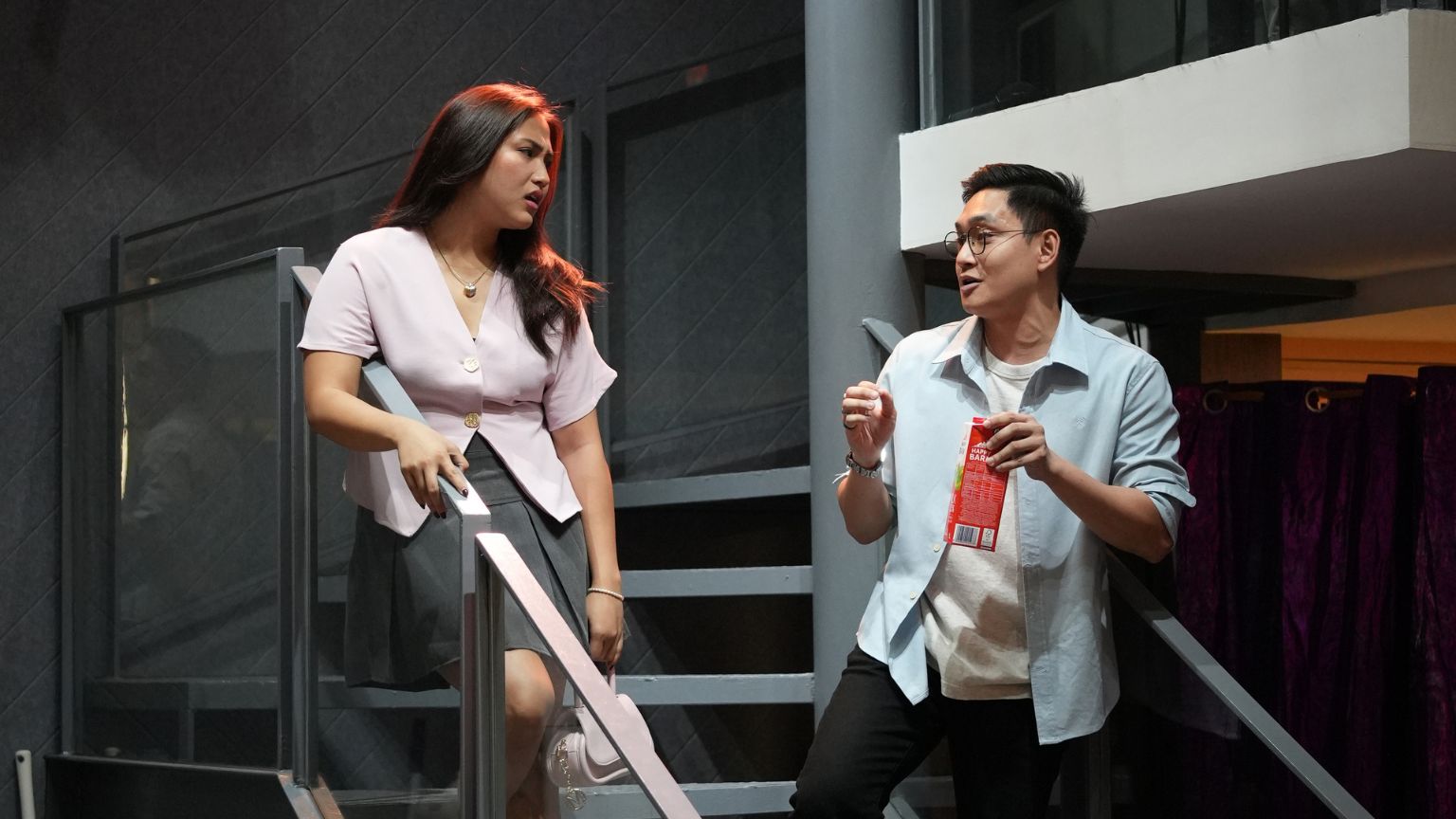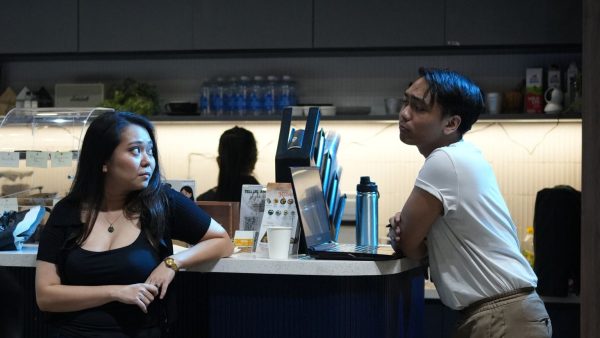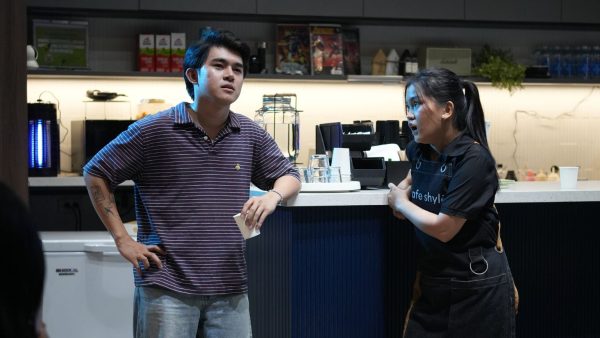
REVIEW: ‘Kapeng Barako Club: Extra Strong’ leaves a bitter aftertaste
“This intimate and immersive production brews a chaotic blend of romantic entanglements that somewhat reflects the murkiness of life.”
Kapeng Barako Club: Extra Strong navigates the relationships among a group of mid-twenty and thirty-something friends, as they deny or discover their true feelings over a hot cup of coffee or even something stronger. Coffee also becomes a metaphor for the characters’ different personalities and emotional states. This play written by Juan Ekis was first staged in 2012 and has gone on to be staged multiple times over the years, often in actual coffee shops, providing an interesting way for the audience to connect with the characters. This is Eksena PH’s first full-length production and the company chose to follow tradition by setting the play in a real café, even including a coffee with the ticket.
Trouble brewing
The play revolves around the complex web of romantic entanglements of a group of friends who, in the vein of classic sitcoms like Friends, frequent a favorite café. This establishment is owned by Marlowe (Paulito Del Mundo), a playwright and a self-professed observer of human behavior who has a will-they-won’t-they dynamic with his old friend, Stef (Isabelle Prado). It’s not quite clear what exactly Stef does, only that, at one point, tired of waiting for Marlowe to confess or confirm his feelings, she leaves and spends time in Germany and Russia. The café is manned by the ever-cheerful barista, Sunshine, or Shine for short, (Vanessa Dulay) who is intimately acquainted with her clients’ drama and who proves to be a keen observer herself.
The action is propelled by the upcoming nuptials of Masi (Sarina Sasaki), who will be marrying the ex-boyfriend of Anna (Ricci Ferrera) while really being in love with her best friend, Eric (Johnny B. Maglinao), who may or may not be in love with Masi too. But who is also invited to be Best Man at the wedding. The final member of the friend group is Joel (Alon Matias), who was Anna’s thesis partner and friend, and who may have finally realized that he has feelings for her too. All the action is complemented by the musical interjections of the café’s singer, Christian (Gerard de Leon), who is just there to keep everyone entertained.
For all the intricacies of the plot, Ekis’ script is filled with realistic dialogue and relatable characters and the story is fairly easy to follow. Karl Jingco’s direction also effectively sets the scene for each romantic kerfuffle. Each character loudly declares what or who they want to everyone else except the actual object of their affections, which forms the crux of most of their problems. Everything comes to a head right before Masi’s wedding and a massive confrontation leads to uncomfortable revelations and painful truths.
Intimate, immediate and immersive
What gives Kapeng Barako Club its distinct flavor is staging it in an actual coffee shop, where the audience members become other customers bearing witness to the drama unfolding around them. The intimate setting lends an immediacy to the proceedings, where it almost feels like audience members are eavesdropping on juicy conversations and where there is even the risk of a drink splashing upon someone during particularly intense scenes. The general ambience of the café (lights and sounds by Tops Peñafiel and Paulo Almaden, respectively) provide a cozy vibe that balances out some of the heavier discussions about the misery of lost love.

L-R: Sarina Sasaki, Johnny B. Maglinao; Photo Credit: Quincy Romillo
This is enhanced by the interactive flourishes added by Jingco, like inviting some audience members to participate in a skit about the historical origins of the term “best man” and the original songs composed and performed by De Leon. Christian occasionally breaks the fourth wall by punctuating awkward moments between characters with humorous, musical interludes, inviting the audience to sing along. While these interactive activities do not really add much to the story, they do help keep audiences more engaged and sometimes add some levity to scenes that become a tad too dramatic.
Different flavors of a hot mess
The actors make valiant efforts to add some nuance to characters that, while familiar, also often come across as immature and petulant. They are indecisive and hypocritical, and sometimes, the biggest obstacles to their own happiness. Del Mundo effectively portrays Marlowe as a pretentious and arrogant intellectual who prefers to process his emotions through his plays while being reluctant to create genuine connections with people. Matias as a love-sick Joel has a boyish charm that also becomes frustrating when one remembers that he is supposed to be an adult, and he still acts like a child around a woman he professes to deeply care for. Sasaki and Maglinao have some sizzling chemistry together, which also makes one wonder why they cannot just figure things out, when there do not seem to be extenuating circumstances preventing them from doing so.

Alon Matias and Vanessa Dulay; Photo Credit: Quincy Romillo
The female characters seem a little less problematic than their male counterparts though the script does not do them any favors. Despite being intelligent, independent and accomplished, all four of them still seem to be pining after oblivious men. Masi is the most extreme of the four, throwing herself into a marriage she doesn’t necessarily want because the man she loves refuses to admit he loves her. Sasaki imbues her performance with all the feminine rage one can expect. Prado’s Stef is just a ball of impatience and frustration, waiting for a man who will always let her down, and one can’t quite be sure of how Ferrera’s Anna feels, as she comes across as a bit inscrutable. Dulay’s Shine is the most charming of the lot, a ray of light in the darkness of the cynics around her. Her cheerfulness never comes across as phony and she projects subtle moments of strength, in her quieter moments, a contrast against the loud and brash posturing of the other characters, who are simply masking their insecurities. And she proves to be a more astute observer of human behavior than Marlowe, and a playwright in her own right, when she reveals that she has written the titular play.
The show tries to explore the themes of unrequited love, missed opportunities and the bittersweet nature of relationships but when most of the characters come across as unlikeable and their issues easily resolved by simple fixes such as slightly better communication, the profundity of these themes does not seem to have been given its due. When the characterization is so paper-thin, there is also not much for the audience to root for.
The final scene is a beautifully performed song number by Dulay, who sings about the perfect blend of love and doubles down on the coffee-as-love metaphor, while trying to win the affections of Marlowe. She seems to impress him with her song, and they run off, hand-in-hand, leaving the audience to speculate on what comes next.
Perhaps the lack of a clear resolution is an attempt at reflecting how things are often that uncertain in real life. But not knowing anything at all about the fates of the characters one has spent the last couple of hours with, in a very intimate setting at that, can’t help but leave one cold. After bearing witness to that glorious confrontation, it would have been some consolation to see some of the consequences play out.
While there’s nothing inherently wrong with an open-ended conclusion, this one felt more frustrating and disappointing than profound and thought-provoking, like a batch of coffee that needed more time to percolate.
Tickets: Php 700.00
Show Dates: June 6-29 2025
Venue: Café Shylo,Pasig City
Running Time: Approx. 2 hours (w/ 10 min intermission)
Company: Eksena PH
Creatives: Juan Ekis (Writer), Karl Jingco (Director), Cy Tiongson (Production Manager), Dianna Magpantay (Stage Manager), Steph Estrella (Asst. Stage Manager), Kevin Jiro Matsuyama (Art Director), Tops Peñafiel (Lights Designer), Paulo Almaden (Sound Designer), Rolando Innocencio (Creative Consultant), Alecx Lorica (Acting Consultant), Gerard de Leon (Original Songs), Ray Raña, Rozen Tabaodaja (Front of House)
Cast: Set A: Isabelle Prado, Sarina Sasaki, Ricci Ferrera, Vanessa Dulay, Johnny B. Maglinao, Alon Matias, Paulito del Mundo, Gerard de Leon; Set B: Isabelle Sophie, Drei Arias, Tristan Bite, Alexa P. SanDiego, Chase Salazar, Vanessa Alariao, Jhon Saint Lovino, Edward Allen H. Solon


Comments